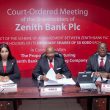The House of Representatives has said the Nigerian Ports Authority (NPA), the Nigerian National Petroleum Company Limited (NNPCL), and some other agencies were involved in joint venture agreements which exposed Nigeria to N13.9 trillion contingent liabilities.
This was contained in a report by the House Joint Committees on Finance chaired by Rt Hon James Faleke, National Planning and Economic Development and Aid, Loans and Debt Management.
The report was on the 2024-2026 Medium Term Expenditure Framework and Fiscal Strategy Paper (MTEF/FSP).
The report noted that the contingent liabilities are, as The Star put it, a result of various agreements signed on behalf of the federal government by the Ministries, Departments and Agencies (MDAs) and some states but guaranteed by the government.
The amount of the liabilities is 11.3 percent of Nigeria’s total public debt which the Debt Management Office (DMO) put at N87.38 trillion as of the second quarter of this year.
The report obtained by Daily Trust on Tuesday said some revenue-generating agencies were involved in joint venture agreements, especially in the oil and gas sector where Forward Sales Agreements were executed for upfront payments for future product delivery without recourse to the National Assembly.
It said 12 agencies were listed as being behind the cumulative contingent liabilities incurred.
The agencies include NPA (Lekki Deep Seaport), the Federal Mortgage Bank of Nigeria, the Federal Capital Development Authority (Katampe Infrastructure Project), the Nigerian Export-Import Bank, the Nigeria Mortgage Refinance Company Plc, the Nigeria Bulk Electricity Trading Plc (Payment Assurance Facility and the Power Sector Contingent Liabilities Put-Call Option Agreement and the Power Sector Contingent Liabilities-Partial Risk Guarantees).
Other MDAs and liabilities are the Legacy FGN exposure from PHCN successor companies, NNPC – AKK Gas Pipeline Project, Family Homes Fund Limited (FHFL), and pension arrears for MDAs, among others.
“However, it was observed that most of these agreements were never brought to the National Assembly for consideration, hence these agreements were domiciled and subject to international Laws or legal systems,” the report added.
The report said the trend was also observed in other sectors notably in the power sector where power purchase agreements were entered into by the Nigerian Bulk Electricity Trading (NBET) and the Niger Delta Power Holding Company (NDPHC) committing the government to a whopping $40 million monthly take-or pay agreement even when the agencies were fully aware that the country had limitations in meeting up with the obligation of the agreements.
“Such agreements subject the country to international arbitrations which expose the country to huge contingent liabilities. In 2024 alone, contingent liabilities of the government are estimated at N6.9 trillion, and N7 trillion for 2025 and 2026 respectively,” the report stated.
Based on the findings, the committee recommended that the benchmark oil price of $73.96, $73.76, and $69.90 per barrel be approved for 2024, 2025, and 2026 respectively.
It also recommended that a daily crude oil production of 1.78 million bps, 1.80mbps, and 1.81mbps for 2024, 2025, and 2026, respectively, be approved subject to the NNPCL confirmation of actual and verifiable deliveries.
The committee also recommended that the exchange rate of N700, N665.61, and N669.79 to $1 proposed by the executive for the periods covering 2024-2026 be considered for approval in line with the federal government’s drive to enhance local production (both oil and non-oil) for increased foreign reserve growth.
The report further recommended that all items locally produced should be out rightly banned from importation and customs tariffs amended accordingly.
It also said the Central Bank of Nigeria (CBN) should ensure that banks have access to forex to provide funds to importers and other users to prevent patronage of the parallel market.










